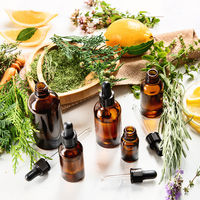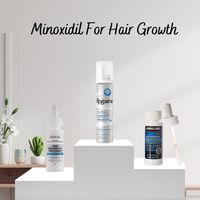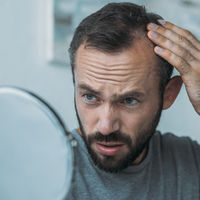
|
Postpartum hair loss is a phenomenon that many women go through after childbirth. This drop can be explained by hormonal changes and high levels of stress. If you experience hair loss during your postpartum period, the objective will not be so much to prevent hair loss but rather to promote hair growth.
Nutrition for postpartum hair loss:
The key nutrients for your postpartum, as recommended by most doctors are:
Iron
During labor women lose a significant amount of blood which was accompanied by a loss of iron. Iron deficiency is a well-known cause of hair loss.
Although the mechanism of action by which iron affects hair growth is not known, hair follicle cells are among the fastest dividing cells in the body, and iron deficiency may contribute to hair loss due to being a cofactor of an enzyme which affects the speed of DNA synthesis.
In addition, many genes have been identified in the human hair follicle, and some may be regulated by iron.
Some iron-rich foods: lentils, liver, shrimp, lamb, beef, spinach, nuts.
|
Vitamin B
Biotin (vitamin B8) contributes to the maintenance of normal hair, as it regulates the expression of proteins, including keratin. In isolated sheep hair follicles, incubation in biotin-containing solutions resulted in increased DNA concentration and protein synthesis.
The role of folate and vitamin B12 in the production of nucleic acids suggests that they may play a role in hair follicle proliferation.
Vitamin B rich foods include: whole grains, leafy green vegetables, nuts, almonds, pistachios, eggs, meat.
Collagen
Hair is mainly made up of the protein keratin. Your body uses several amino acids to make keratin, some of which are found in collagen.
Collagen is mainly composed of three non-essential amino acids: proline, glycine and hydroxyproline. Proline is also the main component of keratin. Therefore, consuming proline-rich collagen could provide your body with the building blocks it needs to generate new hair.
Oxidative stress can also disrupt hair growth, yet collagen has strong antioxidant activity which could contribute to healthy hair.
Zinc
Zinc is an essential component of many enzymes important in protein synthesis and cell division. It also plays a role in the pathways that govern hair follicle development.
Zinc deficiency can cause telogen effluvium and brittle hair. During pregnancy, women draw on their zinc reserves to transmit it to the placenta. Zinc supplementation to compensate for the deficiency can remedy these hair problems.
Eat seafood, liver, pulses, nuts, pumpkin seeds and whole grains like brown rice.
Fatty acids
A deficiency in essential polyunsaturated fatty acids, linoleic acid (omega 6) and alpha-linolenic acid (an omega 3), can result in hair changes including hair loss and eyebrow loss as well as thinning hair . Unsaturated fatty acids can modulate the action of androgens (androgen hormones promote hair loss). In addition, arachidonic acid, an omega 6 fatty acid found in eggs, among others, can promote hair growth by increasing the proliferation of follicles.
Vitamin D
Data from animal studies suggest that vitamin D plays a role in hair follicle cycling. Studies have shown that there are vitamin D receptors in cells in the growth phases of the hair cycle, so vitamin D intake could promote hair growth.
Some foods rich in vitamin D: dairy products, egg yolk, fish, cod and cod liver oil.
Curcumin, an active found in turmeric, helps activate vitamin D receptors, which may indirectly help hair growth. One study even mentions that turmeric has stimulating properties for the hair.
Rebalancing your hormones postpartum
Hormonal changes are probably the main cause of postpartum hair loss. To try to decrease this effect, you can consume magnesium and vitamin B6 which will help you balance your hormones.
Knowing that stress can also be a cause of postpartum hair loss, lowering stress levels could be beneficial. Studies show that an increase in magnesium intake reduces stress, and that magnesium supplementation is beneficial in stressed subjects The combined effect of magnesium and vitamin B6 could also help in case of anxiety.
For this you can consume foods such as: mint, rosemary, calf or turkey liver, salmon and mackerel, seeds and oilseeds, peppers, Brussels sprouts, leeks, bananas.
|
Natural ingredients to help your postpartum hair
Silica could be helpful in hair growth. Studies show that wicks with a high silicon content tend to have a lower fall rate and higher shine. For example, the silica in horsetail helps maintain hair, nails, and skin in optimal condition. Bamboo also contains high levels of silica.
Please note that bamboo is not recommended for pregnant women.
Ginseng is an interesting plant for hair growth. Ginsenoside (an active compound of ginseng) is able to increase hair shaft length, lifespan and stimulates hair shaft elongation in mouse whisker cultures. It also promotes proliferation of human dermal follicle cells and keratinocytes and enhances induction of hair anagen or acceleration of hair growth in mice.
Korean and Siberian ginseng are a priori safe during pregnancy and breastfeeding, but prefer to take medical advice before using them!
Studies show that ginkgo and nettle extracts may also stimulate hair growth.
|
When pregnant, nettle is also to be avoided (abortifacient and emmenagogue potential, estrogenic effect, but during pregnancy we avoid using plants with a hormonal effect). There are no reports in the scientific literature indicating that nettle leaf is safe or contraindicated during breastfeeding.
In a randomized controlled study, they showed that the consumption of garlic powder significantly increased hair growth, compared to the placebo which had no effect, which could be due to the fact that garlic increases the blood flow in the capillaries of the scalp.
Bonus tips
Avoid hairstyles that are too tight, such as braids, buns or ponytails. Avoid twisting or rubbing your hair.
Wash and brush your hair gently, using a wide tooth comb if necessary to avoid pulling the roots too much.
Hot rollers, curling or straightening irons, hot oil treatments, bleaching and other chemical processes are also to be avoided.
Tip: give yourself a scalp massage, starting from the neck and going up to the top of the skull in a circular movement of your fingers, it seems that this would promote the microcirculation of the scalp and the thickness of the hair.
ConclusionPostpartum hair loss is mostly due to hormonal changes that occur after childbirth, but also to stress levels. It is a natural postpartum phenomenon (but it does not occur in all women). There is no treatment or miracle cures to prevent this hair loss. However, as an alternative you can try to promote the regrowth of your hair, by consuming certain nutrients or natural ingredients that have beneficial properties on the growth of your hair. Be careful not to supplement yourself, food supplements are not trivial, can interfere with other supplements, foods and medicines, or not be adapted to your personal situation, not to mention that you have to choose and adapt the dosages. It is therefore preferable to seek advice from a health practitioner specializing in nutrition, especially if you are breastfeeding. |
References:
https://www.babycenter.com/baby/postpartum-health/postpartum-hair-loss_11721
https://www.webmd.com/parenting/what-to-do-if-you-have-postpartum-hair-loss
https://health.clevelandclinic.org/how-to-deal-with-hair-loss-after-pregnancy/
https://www.whattoexpect.com/first-year/postpartum-health-and-care/postpartum-hair-loss/
Written by: ClinicAdvisor® Research Team
Medically Reviewed by the dermatologists at: Expert Hair Transplant clinic








Share Your Opinion, Please